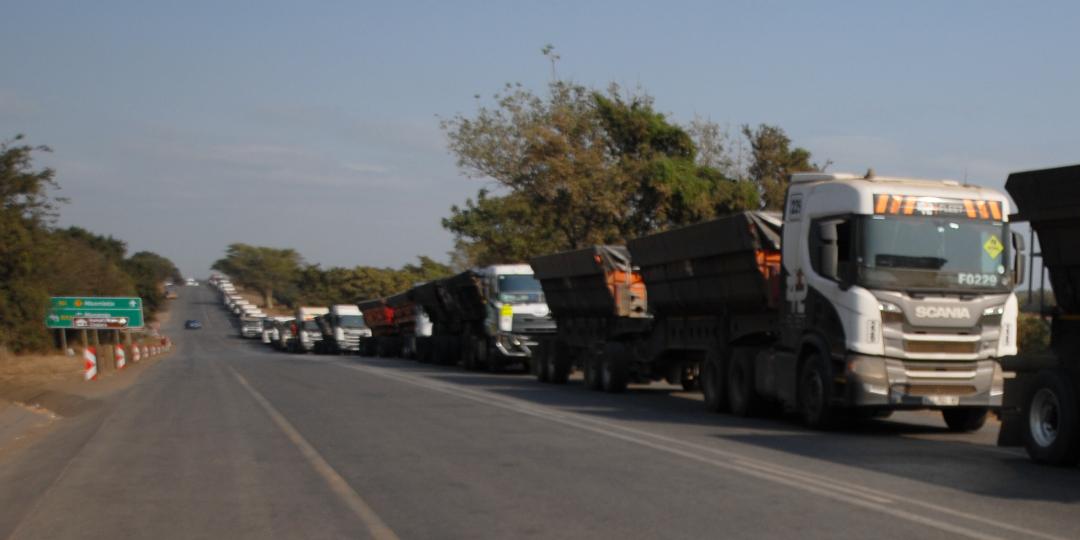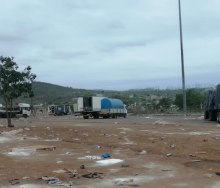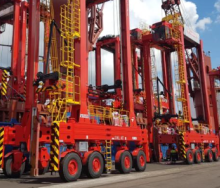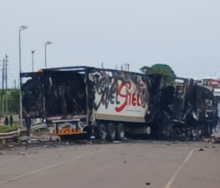A truck driver waiting in the queue at South Africa’s Lebombo border into Mozambique on the N4 apparently pulled a gun on taxi marshals over the weekend when they tried to rob him.
But a reliable source from Komatipoort’s business community said on Saturday morning that it was not the case.
The taxi associations are only here to help keep the road open and not to rob truck drivers, said the source who talks to Freight News on condition of anonymity.
And yet, a driver carrying chrome from Emalahleni (Witbank), Donald Galeng, said a case of attempted armed robbery had been opened with the local branch of the South Africa Police Service (SAPS).
He added that a shot had been fired and shared pics of the truck’s damaged cab, showing what appears to be a bullet hole and shattered glass inside the cabin of the truck belonging to MDZ Holdings.
Friday night’s incident once again proves that the situation on the “Maputo Corridor”, where ore export volumes to the Port of Maputo surpass the border’s cargo processing capability, is on a knife-edge.
A few weeks ago representatives from several taxi associations carrying commuters on the N4 – some say 27 associations are involved – decided to help keep the N4 open.
Although traffic officials do what they can by day, at night they retreat to safety because the SAPS doesn’t have the manpower to protect them against criminals ‘working’ the line.
Traffic officers also don’t get overtime because Mpumalanga’s provincial legislature has said there’s no budget.
So when police officers are few and far between, and traffic officials aren’t there, cross-border truckers often skip the queue, gridlocking the road to the border.
Now, from dusk to dawn, taxi marshals are trying to maintain a semblance of law and order, preventing trucks from skipping the queue and using force if needs be.
Armed with sjamboks and wearing reflective vests, they bang on trucks where drivers have fallen asleep on the side of the road, doing whatever they can to stop the road from getting clogged up.
Often, when a truck skips the queue, the driver is stopped and a cabin tyre deflated, necessitating a breakdown to get the truck mobile again.
The business source, as well as several others, said that although it was not an ideal situation, the taxi marshals were helping to keep things orderly – at least as orderly as can be given the number of trucks arriving at the border.
Last Wednesday, Galeng arrived at the back of the 15-kilometre queue at about 15:00.
By 06:00 on Thursday morning, July 6, he was still about four kilometres from the border, meaning it took him 16 hours to move 11km closer to the congested crossing.
He said at night it was not safe in the queue at all.
Although the taxi marshals help to maintain order, Galeng said they often manhandled drivers and damaged their trucks.
Worst-case scenario, drivers are sometimes kidnapped by armed criminals demanding a ransom of as much as R50 000.
The business source said a gang based in Ressano Garcia on Mozambique’s side of the border, The Challengers, came through the border at night, terrorising people in the queue.
“They kidnap drivers, hold up passengers and force women into the bush where they rape them.”
Galeng said a proper staging area for all the trucks was urgently needed to manage the flow of trucks through the border safely and responsibly.
“The government is failing drivers,” he said.
Watch part of the interview with Donald Galeng below:














